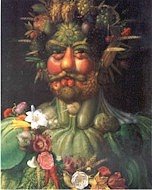In my first year of college (40 years ago), I was becoming an atheist. It didn't take long at all. It started in the first week of classes, when my history professor, Dr. Patterson, offhandedly classified Christianity as just one of many Eastern mystery cults centered around a divine or semi-divine hero who dies and is resurrected in some way.
This was the first extra-cultural assessment of Christianity I had experienced since the eighth grade when I read Aldous Huxley’s
Ape and Essence. Dr. Patterson’s offhandedness shook me. Around the Southern Baptist circles I grew up in, such a statement would have been cause for concern that the person was headed straight for hell. But here was this very smart, distinguished professor who had a system within which Christianity could be classified as just one of many other religions and cults. His system seemed to subsume Christianity, which I had always been taught was the system that subsumed everything else. It was shock to my system.
Within a few days, I had attended a logic class that I was required to take in lieu of math. The professor was very bright and entertaining, and he quickly gave us all the standard anti-design, anti-omniscient God arguments. Here are some of them:
Infinite regression -- The argument for God's existence based on first causes says that everything in the world has a cause, and if you keep regressing backward from cause to cause, eventually you come to a first cause of the universe, hence to God, The First Cause of everything, the Creator.
The English philosopher David Hume said that if you keep regressing you come back to the first physical fact or set of facts that you can identify. These are all about the physical universe at some early stage or time or about some fundamental, but simple, physical laws. To go further and add God as the cause of these is to add an immensely more complicated explanation than the simple physical universe as the cause of everything. Moving down the cause of causes, everything gets simpler and simpler until you get to the God part, where it gets infinitely complex. This violates Ockham’s Razor which makes the whole argument messy and logically dubious. (Scientists and philosophers usually follow Ockham's Razor, which is the idea that, if offered two explanations for something, both of which fit the facts equally well, the simplest explanation should be preferred.)
Free will and omniscience -- It is said by Western religion that people have free will, but if God is omniscient, knows every action past and future, how can people choose an action other than what God already knows? So, how can you say people have free will?
The problem of evil -- If God is omnipotent, all powerful, as Western religion always claims, isn't he responsible for evil. He has the power; he could stop it if he wanted to; so either you have to admit that God is responsible for evil or that he doesn't exist. If he exists, he is responsible for evil by definition.
Hearing all these arguments was delicious for me, eye opening. I'd never heard such things in Sunday school. I felt my parents had been keeping a lot of secrets hidden from me; or, more likely, they were just ignorant, and religion had deliberately kept them that way. I felt like I was finally hearing the truth. I had some uneasy feeling about listening to these arguments, a fear that God really might be there and this was sacreligious; but I viewed these thoughts as a relic of religious guilt and that to be free, I needed to embark on a campaign to extirpate all such thoughts.
Overnight, I was an atheist. I thought, all of a sudden, that no intelligent person could believe in God. If they believed in God, it was proof they weren't intelligent. (I didn't learn about circular arguments until later in the term, and by then I believed this one so firmly, that I didn't think to apply a test of circularity to my own prejudices.)
The Roots of Atheism
I think several things were going on that I wasn't fully aware of:
1. I was rebelling from the religious oppression of my culture and my parents. Both used religion as a means of control and manipulation. Be a good child and obey your parents because God is watching you and will punish you if you don't obey. Never mind if the parents were behaving like tyrants or sexual deviants, children must respect them and never talk back. I think this rebellion was absolutely healthy. The tragedy was that my parents and the culture used religion the way they did and made it so unpalatable as a result.
2. A second failing of the culture was in hiding the intellectual challenges to its beliefs; so that when I finally heard them, I thought that religion must be on the side of ignorance, which in our culture it was. Again, I was perfectly justified in coming to the conclusion I did and rebelling against the ignorance machine. Again, the tragedy is that things shouldn't have been hidden, and didn't need to be. Hiding them just made young people vulnerable when they encountered legitimate questions that they should have been given answers to by the culture. Instead, we were told not to ask such questions, that they were sacrilegious.
3. A third reason why I think I rebelled was because of guilt over my sexuality. Since puberty hit at fourteen, I had felt guilty before God about having a strong set of sexual feelings and about masturbating and looking at women sexually. There was something secretive in the whole thing. My parents preferred not to discuss sex, and it all seemed tainted. My religion looked on sex as dubious and thundered against sexual feeling except in marriage, where it was acceptable but not exactly subject of polite conversation. So if God was against sex, I was only too happy to get rid of God finally to relieve my guilt. I thought religion was ignorant and old-fashioned about sex, which my religion was.
Again I was right to assert my right to have sexual feelings, but I had no idea of the perils and power of the sexual drive and of the reasons why religion-- healthy religion-- might want to seek sacred containers for the drive, harness it positively. So I threw the baby out with the bathwater and assumed that all restrictions on sex were just an evil and ignorant attempt to control and stamp out what was a good thing. In my parent's case, it probably was just that. It didn't occur to me that God had created sex and that he might think it was good. N0, God was aligned with spoiling all the fun, just like my parents and the Southern Baptists, so out with God!
The Big Questions AgainConcerning the three questions my logic professor brought up, infinite regression, free will, and the problem of evil, I think these are Western Civilization's counterpart to Zen koans. Koans are questions that seem self-contradictory like "What is the sound of one hand clapping?" Zen masters ask these questions to get their charges to push their minds out to their limits and eventually abandon such questions and accept things as they are, contradictions and all. Almost everybody comes up against these questions of omnipotence, omniscience, and evil in Western culture, even though they may not go to college and think about them directly.
Infinite regression -- One of the first questions a child asks about God is "Who made God?"-- infinite regression. The question is natural and, I think, caused by the limitations of our minds, which are conditioned to think in linear terms. We are time-dominated because of the very way we are constructed and because of entropy.
Entropy is a fundamental law of nature that says that in any closed system things tend to go from an ordered state to a more disordered state. This creates an arrow of time pointing in one direction. On Wednesday my room is clean, on Friday it's a mess. Given the way we perceive, we notice the before and after and call the process of change "time". We say time has passed when we mean, things have changed. We are born, we live, we die. Any form of life is a closed system that temporarily defeats entropy by eating, using the fuel in food to maintain the order of the system and by exporting entropy in the form of radiated heat and waste. However, even this system breaks down, and we eventually die. So our consciousness is influenced by our awareness of entropy and time, hence the before and after questions. If you get to the end of an infinite regression and ask, "Where did the universe come from?" Religious people answer God, but the child asks, "Where did God come from?"
Stephan Hawking, a physicist, recently gave a new twist to this question by saying the universe self-booted from a quantum fluctuation. Well, where did the laws of quantum mechanics come from? An honest answer to the question of infinite regression and where the universe or God came from is, I think, "nobody knows." Western religious people believe a benevolent God created the universe; scientists, speaking as scientists, have to stick to what they can measure or extrapolate from physical principles, so they don't attempt to go beyond the physical, and rightly so.
Some religious people and mystics claim to know about ultimate questions, but this knowing is a matter of intuition, strong belief, and experience, not scientific measurement. Scientists don't claim to know absolutely, even what they know. New data can change everything, and frequently does.
All these arguments, in my mind, call for humility.There are limits to what we can say we know and we ought not to be arrogant and persecute people for what we think we know. These are my thoughts on infinite regression. Over my life, I have periodically asked this question over and over and sought the answers. Even though I "know" I will never find the absolute answers, it has helped me to periodically bash up against this on-the-edge question to help define my own limits of knowledge. I can choose to believe God created the universe or choose to believe the universe is self-caused and essentially without meaning or benevolence. What I choose to believe says more about what I want than it does about what is the truth about the origin of the universe.
Free will -- Most people encounter issues of free will when we feel driven by strong internal or external forces, so that we temporarily feel we have no choice but to act in a certain way. We don't feel free. We feel driven by sex, ambition, circumstances, fear, or duty.
If we are educated, we may logically try to understand free will or, conversely, logically insist there is a cause for everything, for every action. Other times we feel definitely that we have made choices that have changed our lives. A businessperson is languishing in the midst of a recession or company restructuring, then becomes convinced that she can make a difference. She sets some goals and acts each day to achieve those goals. She never quits in the face of adversity because she believes if she persists, odds are she will get what she wants. She eventually does. She has a strong sense of freedom and control over her life.
People generally behave toward each other as if we were responsible (that is, free). If I sleep around on my wife, she will hold me responsible if she finds out. She assumes I could have chosen not to sleep around. However, a Freudian psychologist would reduce such an interaction, especially my "choosing" to sleep around to a series of physical conflicting impulses that got out of balance in one direction (taking the woman to bed) because of all sorts of environmental influences--pressure from awareness of middle age, pressure from work, poor moral upbringing as a child, etc. The Apostle Paul in the Book of Romans dealt with this issue extensively from a Christian perspective. We are slaves to sin, but God (Christ) sets us free, makes it possible for us to make positive choices, not choices driven solely by our impulses. Eastern thinking might tend to say that we are indeed an effect, that enlightenment is finally knowing this, and that this knowing sets us free (sort of).
Freedom, I think, is an inward variation on the infinite regression issue. If I go far enough inward or backward though the various impulses, thoughts, and other influences that "caused" me to act in a certain way, is there ever a point of creation by some godlike free spark within me. Or, should I just stick to causative physical phenomena? I can "choose" to believe either way. In our lives, I think we all choose at times to act as if we are free and at other times "choose" to act as if we are bound-slaves to destiny. Which are we? What do I choose to believe at this moment?
The Problem of Evil -- A child is raped and killed by a man who was himself abused as a child and is mentally ill. A tornado collapses a cafeteria killing a hundred people. Why does an all-powerful, benevolent God allow such things to happen? People have answered this question in various ways. The answer may also depend on whether the evil is happening to someone else or to them. In the case of the raped child, one could say that this is not God's will but man's evil and to assure mankind's freedom (back to that!) God must keep his hands off when someone chooses to do evil instead of good. If it’s my child or me whose getting raped, this answer isn't very consoling or convincing, especially if I have prayed for the safety of the person harmed. In the case of the tornado, the devastation has nothing to do with any action or inaction of people. It is pure, blind chance that the tornado hit the cafeteria. Yet, it is hard for the relatives of the deceased to understand why God let this awful event happen.
When Job asks God why evil is happening to him, God basically tells him that it's none of his business.
Others have suggested that God is not all good, but has a dark side (the “Force” of Star Wars or Jung). Pagan religions anthropomorphised the godhead into distinct entities with competing interests and thus explained evil. The gods weren't better than us, just more powerful.
Jesus, accepted that evil things happen to good people and good things to evil people as a given. He said if a tower falls on a hundred people, can we say that all of them died because they were unrighteous? No. He also said that the sun shines on the good and the evil.
Ralph Carnes, an Episcopal priest I know, says, "You just play the cards you're dealt. That's what life is about." That was his restatement of Jesus' acceptance of evil in the world as a given. Jesus didn't try to answer this question, he just said, "I am with you always, even to the end of the earth." So, the Christian answer seems to be that God suffers with us--the incarnation--suffers from the consequences of the freedom we have been given. Of course, this is still hard to accept when my child gets raped or I suffer from outrageous fortune.
The “Final” IterationNo doubt, being the way I am, I will iterate the big questions many times in my life. Ultimately, and this time is much closer than previously, my life will end and I will either know the truth, not be aware of anything, or be allowed to keep asking even after death. I guess even if the latter is true, I could choose to quit asking such questions and just accept what is given. Maybe this approach is not so bad even before death.
David Orr






